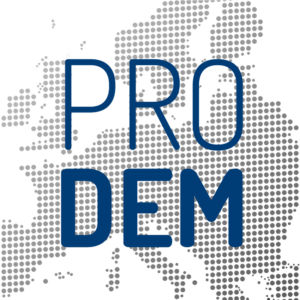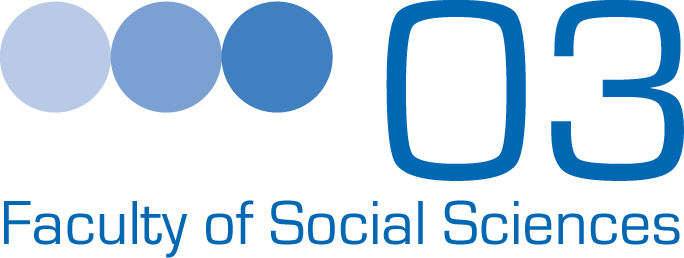The idea of our research
Regarding methodological research, we focus on Qualitative Comparative Analysis (QCA) and other set-theoretical approaches as well as case comparison. At the same time, some of our methodological publications are also introductory in nature.
Our substantive research is also methodological in nature, whether through QCA or other methods such as content analysis. Following our broad range of interests, we deal with topics as diverse as political protest, interest groups, democracy and autocracy, and the German-Italian relationship.

Protests and Democracy: How Movement Parties, Social Movements and Active Citizens are Reshaping Europe (PRODEM)
To the official project website
Contributors
Principal Investigator & Contact
Prof. Dr. Claudius Wagemann
Professor for Political Science
PEG 3G 124
+49 69/798 36647
wagemann@soz.uni-frankfurt.de
Requests for office hours to
methoden-qualitativ@soz.uni-frankfurt.de
Professor Wagemann is on a research semester in the summer semester 2024 and therefore cannot offer regular office hours.
Anna Geyer
Student assistant
a.geyer@em-uni-frankfurt.de
László Boroffka
Student assistant
boroffka@soz.uni-frankfurt.de
Dr. Dan Mercea
Department of Sociology School of Arts and Social Sciences
University of London
Dr. Toma Burean
College of Political Science Public Administration and Communication
Universitatea Babes-Bolyai
Prof. Dr. Lorenzo Mosca
Department of Economics and Business Sciences
Università di Parma
More information
ProDem investigates how interactions between citizens, social movements, and a specific breed of political parties (so-called 'movement parties', della Porta et al 2017; Kitschelt 2006; Mosca and Quaranta 2017) influence democratic quality in Europe. We approach democratic quality from a citizens' perspective as the acquisition of political, civil, and social citizenship rights through democratic institutions and processes (della Porta 2016:8-9). The interplay among citizens, media, and political organisations is at the heart of our inquiry into democratic quality.
Since 2011 and in the wake of the European financial, economic, and migration crises, mass protests have engendered new social movements and political parties. This development has been interpreted in two main ways. Research into political culture describes the increase in protests as a consequence of long-term sociocultural change, leading to growing numbers of 'critical citizens' who question authority but remain committed to democratic values (Dalton and Welzel 2014; Norris 2011). Protesting therefore belongs to civic attitudes deeply rooted in European democracies (Klingemann 2014:139-140).
Researchers studying the 'quality of democracy' have developed a more ambivalent approach, regarding the spread of protests as symptomatic of democratic backsliding (Bermeo 2016; Foa and Mounk 2016; Krastev 2014). Dissatisfied with the performance of democracies, sizeable sections of the citizenry have protested by voting for populist parties, contributing to an erosion of liberal democratic standards (Pirro 2015). Some social movements and their populist party vehicles (e.g. Movimento 5 Stelle) have mobilised citizens by framing political conflicts as a confrontation between corrupt, unaccountable, foreign-controlled, mainstream media-supported elites and ordinary people (Mudde 2004) expressing their grievances on social media (Engesser et al. 2017; Neumayer 2016). Polarising worldviews, often coupled with nativist frames, tend to negate political pluralism and erode attachment to the norms underpinning liberal democracy (Mudde 2007; Levitsky and Ziblatt 2018). Activists have, however, also resorted to protest to resist illiberal policies (Dimitrova 2018; Fomina and Kucharczyk 2016).
ProDem comparatively assesses the medium- and long-term effects of this triple interaction between citizens, social movements, and movement parties on democratic quality in European democracies. We seek robust and innovative explanations for how social movements and movement parties, alongside shifting divisions in citizens' values, ideologies, and attitudes, have affected democratic quality in six European countries (Denmark, Germany, Hungary, Italy, Romania, and the UK) between the onset of a global wave of protests in 2011 and 2019. ProDem will generate new, timely insights from comparative analysis of democratic quality by combining concepts and methods from social movement studies, political behaviour and party politics, political culture, critical theory, media studies, and computational social science.
GDPR-compliance: The project collects data based on public profiles of political parties and social movements on social media platforms using publicly available information. This may include handles of users who interacted with these profiles.
Smart Authoritarianism? Comparing the Internet Strategies of Authoritarian Regimes"
Contributors
Contact
Maria Halloran
Student assistant
halloran@soz.uni-frankfurt.de
Variations of Governance in Hybrid Regimes. Business, State and Civil Society in Contemporary Russia (GOVRUS)
Das Projekt «Variationen von Governance in hybriden Regimen. Unternehmen, Staat und Zivilgesellschaft im heutigen Russland»untersucht, welche Rolle russische und internationale Unternehmen im Rahmen von CSR-Strategien spielen und welche Formen von Governance zwischen staatlichen, nicht-staatlichen Akteuren und Unternehmen sich daraus in Russland ergeben. Von besonderer Bedeutung ist die Frage, wie die Befunde in das Spannungsfeld zwischen pfadabhängiger Entwicklung und der Entstehung neuartiger Formen unternehmerischer und staatlicher Kooperation einzuordnen sind. Die Analyse umfasst vornehmlich die Branchen der Öl- und Gasindustrie, des Handels sowie der Metallurgie in den Regionen Volgograd, Tyumen und Kemerovo. In methodischer Hinsicht verbindet das Projekt ein Fallstudiendesign mit einer QCA-Analyse.
Zur offiziellen Webseite des Projekts
Contributors
Principal Investigator
Prof. Dr. Claudius Wagemann
Professor for Political Science
PEG 3G 124
+49 69/798 36647
wagemann@soz.uni-frankfurt.de
Requests for office hours to
methoden-qualitativ@soz.uni-frankfurt.de
Professor Wagemann is on a research semester in the summer semester 2024 and therefore cannot offer regular office hours.
Contact
Dr. Benedikt Bender
Research Fellow
PEG 2G 157
+49 69 798 36641
b.bender@soz.uni-frankfurt.de
Website, Orcid, Twitter
Office hours
Registration by email
Tuesday 16:00 - 18:00
Sabine Kropp
Arbeitsstelle Politisches System der Bundesrepublik Deutschland
FU Berlin
Prof. Dr.Katharina Bluhm
Osteuropa-InstitutFU Berlin
More information
One arena in which interactions between companies and state actors take place, and in which NGOs are also partly involved, is represented by the corporate social responsibility (CSR) activities of large companies in Russia. In a narrower sense, CSR does involve voluntary commitment; this is also repeatedly emphasized by Russian business associations. From the very beginning, however, CSR has also been used by the state as an instrument to integrate companies into the restored power vertical and to commit them to state programs. This is especially true at the regional level, whose administrations are burdened with a wide range of sociopolitical and development tasks without having sufficient tax revenues.
The aim is to clarify why companies, state actors and NGOs participate in CSR, which - more or less institutionalized - variants of governance result from their interactions and how these are linked to vertical instruments of state governance. CSR thus serves as an application example to study patterns of governance in new authoritarian or hybrid regimes.
The project operates at the interface of political science and corporate sociology. Theoretically, the metagovernance perspective is combined with approaches of resource dependency and exchange. In comparative qualitative case studies, different industries and regions are examined. The starting point of the survey is 21 enterprises of large companies from the oil and gas industry, metallurgy and trade in three selected subjects of the Federation (Volgograd, Tyumen, Kemerovo). A Qualitative Comparative Analysis (QCA) is associated with the case study design, which allows to precisely elaborate different configurations and invariants. The project therefore also adds methodological value.
Political Conflict Reform Monitor (ReMoPo)
Contributors
Contact
Dr. Benedikt Bender
Research Fellow
PEG 2G 157
+49 69 798 36641
b.bender@soz.uni-frankfurt.de
Website, Orcid, Twitter
Office hours
Registration by email
Tuesday 16:00 - 18:00
Marco Schreiner
Student assistant
schreiner@soz.uni-frankfurt.de
More information
To answer these questions empirically, documents (press releases and Twitter data) are analyzed and expert interviews are conducted. The ReMoPo dataset starts in 2000 and currently includes seven employers' associations, six trade unions and seven political parties. The dataset is used by Dr. Bender and his team in teaching and research, as well as by our students for term papers and theses.
In summary, from the analyses to date, support for welfare state policies varies by issue and can change as contexts change. Particularly in the topic of social investemnets, equal interests have been shown to explain welfare state development. This means that purely ideological factors of organization types per se (such as labor vs. capital) are not sufficient explanations but need to be complemented by pragmatic explanatory factors.
In perspective, the data set will be extended in two directions: On the one hand, the positions of the Acutere are to be analyzed in an EU country comparison, and on the other hand, a focus is also to be placed on the German states.
Qualitative Comparative Analysis (QCA)
Contributors
Contact
Prof. Dr. Claudius Wagemann
Professor for Political Science
PEG 3G 124
+49 69/798 36647
wagemann@soz.uni-frankfurt.de
Requests for office hours to
methoden-qualitativ@soz.uni-frankfurt.de
Professor Wagemann is on a research semester in the summer semester 2024 and therefore cannot offer regular office hours.
Methodology application in Europe
Contributors
Principal Investigator
Prof. Dr. Claudius Wagemann
Professor for Political Science
PEG 3G 124
+49 69/798 36647
wagemann@soz.uni-frankfurt.de
Requests for office hours to
methoden-qualitativ@soz.uni-frankfurt.de
Professor Wagemann is on a research semester in the summer semester 2024 and therefore cannot offer regular office hours.
Contact
Lukas Brenner
Research Fellow
PEG 3G 114
+49 69 798 36646
brenner@soz.uni-frankfurt.de
Office hours
Registration by email
Luca Verzichelli
Department of Social, Political and Cognitive Sciences
University Siena
Damir Kapidzic
Faculty of Political Science
University Sarajewo
- Studying at Goethe University
- International applicants
- Faculties
- Overview of study programmes
- Programme for refugees
- GRADE
- Goethe Business School (continuing education)
- Research at Goethe University
- Scientific news
- Goethe Welcome Center (for international researchers)
- Collaborative research projects
- Individual research
- Visiting fellowships
- Endowed chairs
- About the University
- News-in-brief
- University administration
- Campus locations
- Campus life
- University archives (German)
- Rhine-Main-Universities






